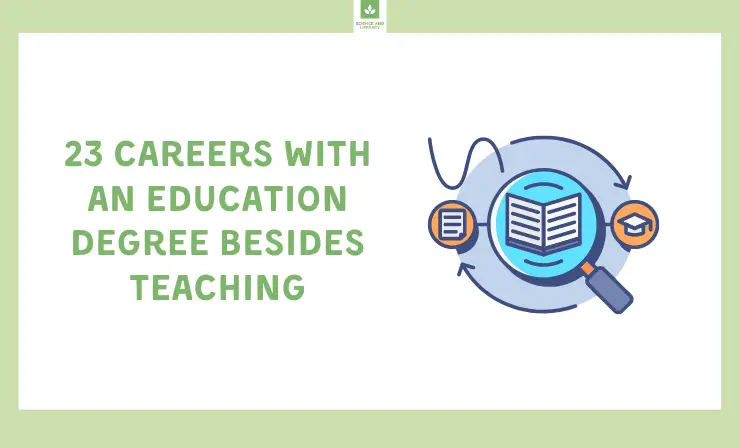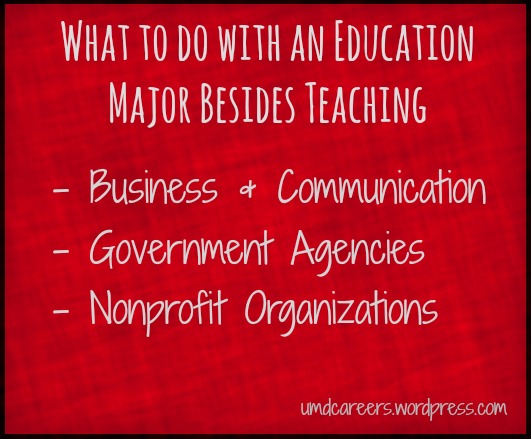With an education degree, you can pursue careers in educational administration, curriculum design, or corporate training. Other paths include educational technology, consulting, and nonprofit educational initiatives.
Holding an education degree opens doors to a myriad of opportunities beyond traditional teaching roles. Many graduates leverage their expertise to shape school policies or develop the next generation of learning materials as educational administrators or curriculum designers. Their understanding of learning principles is valuable in corporate environments, too, where they can enhance employee training programs or take on roles as instructional coordinators.
The tech-savvy may gravitate towards educational technology, creating or implementing software that transforms the classroom experience. For those drawn to broader societal impacts, consulting roles allow for influence over educational systems, while nonprofit work can channel their passion into community-based education projects. With the foundation of an education degree, your career can impact learning environments in diverse and meaningful ways.

Credit: scienceandliteracy.org
The Value Of An Education Degree
An education degree offers flexibility and diverse opportunities far beyond the traditional teaching path. The skills and experiences gained from this degree can unlock various career doors. Understanding the full value of an education degree sheds light on its potential outside of the classroom setting.
Broad Skills Acquired
An education degree equips graduates with a variety of marketable skills.
- Critical thinking and problem-solving abilities are honed through designing curricula and managing classrooms.
- Effective communication comes from daily engagement with diverse groups.
- Candidates become adept in organizational management through planning and executing lessons.
Transferable Attributes
These broad skills translate into transferable attributes.
| Attribute | How It Transfers |
|---|---|
| Adaptability | Candidates seamlessly adjust to variable work environments. |
| Teamwork | Collaborative experience makes for smooth team integration. |
| Leadership | Past leadership roles pave the way for management positions. |
The overall versatility of an education degree lays a solid foundation for various careers. It enhances critical job market skills. These attributes make graduates attractive candidates in diverse fields.
Beyond The Classroom
Thinking about an education degree sparks thoughts of chalkboards and classrooms.
Yet, beyond these school walls lie a vast world of opportunities. With an education degree, you’re not limited to the traditional teaching path.
Skills learned in education programs apply to many fields. Let’s debunk some myths and explore the diverse careers awaiting education graduates.
Common Misconceptions
A common belief is that education degrees lock you into teaching only.
This is not true.
Education degrees equip you with versatile skills.
- Leadership – Managing a classroom is like running a small team.
- Organization – Lesson planning requires top-notch organizational skills.
- Communication – Conveying complex ideas in simple terms is an art.
These skills open doors to many positions outside a traditional classroom.
Diverse Opportunities
An education degree paves the way for diverse roles.
Think beyond teaching.
Here are intriguing paths to consider:
| Job Role | Description |
|---|---|
| Educational Consultant | Guide schools or businesses in curriculum development and teaching strategies. |
| Curriculum Developer | Create educational content for publishers or organizations. |
| Instructional Coordinator | Oversee school curriculums and teaching standards. |
| Museum Educator | Design and deliver educational programs in museum settings. |
| Corporate Trainer | Develop and conduct training programs for company employees. |
These positions utilize educational insights in varied environments.
Educational Consulting
Many people think an education degree pins you to the classroom, but that’s far from the truth. Educational Consulting is a thrilling avenue that opens up a world of opportunities beyond traditional teaching roles. With this path, individuals with an education degree can leverage their knowledge and skills to make a widespread impact across the educational landscape.
Advising Schools And Businesses
Educational consultants play a crucial role in advising schools and businesses. They bring fresh perspectives to educational institutions and help businesses integrate effective learning strategies.
- School Improvement Plans: Consultants analyze and develop strategies to enhance school performance.
- Curriculum Design: Expert guidance shapes engaging and relevant curricula.
- Professional Development: Tailored training programs boost teacher effectiveness.
- Learning Solutions for Businesses: Firms receive bespoke educational strategies that align with their goals.
Starting A Consulting Practice
Launching your educational consulting practice unlocks a level of independence. It allows you to handpick your projects, setting the stage for a fulfilling career.
- Identify Your Niche: Focus on an area of expertise to stand out in the market.
- Build a Network: Connect with educators and industry leaders to grow your client base.
- Marketing: Harness digital platforms to showcase your services effectively.
- Create Resources: Develop workshops, guides, and other materials to support your consulting services.
Curriculum Design
Exploring the vibrant world of curriculum design opens doors for those with an education degree. It’s a chance to shape the educational journey without stepping into the classroom. Curriculum design isn’t just about picking textbooks. It’s about creating the full educational experience.
Crafting Educational Materials
Educational degrees equip people to develop creative, effective learning resources. These materials guide students through their academic paths. Learning resources vary from dynamic digital content to engaging printed workbooks. Curriculum designers ensure content aligns with learning goals and standards.
- Interactive activities that drive student engagement.
- Assessments that measure student progress effectively.
- Visual aids, like infographics, to enhance understanding.
Working With Publishers
Education degree holders can collaborate with publishing houses. These partnerships focus on creating textbooks and educational materials. Professionals contribute their classroom insights to refine content quality. They help tailor materials to meet curriculum goals across various learning contexts.
| Publisher Collaboration | Impact on Curriculum |
|---|---|
| Content Research | Ensuring factual accuracy and relevance. |
| Material Development | Designing learner-centric resources. |
| User Feedback Gathering | Incorporating educator and student insights. |
Corporate Training And Development
An education degree opens the door to diverse and dynamic opportunities in the corporate sector, especially in the realm of Corporate Training and Development. Individuals with educational expertise can steer the growth and skill enhancement of a company’s workforce. By delving into Educational Roles in Companies and Creating Training Programs, let’s explore the invaluable contributions one can make beyond the traditional classroom.
Educational Roles In Companies
Within the corporate structure, education degree holders play integral roles. They are pivotal in identifying skill gaps and fostering a continuous learning environment. Key positions include:
- Training Coordinator: Orchestrates logistical aspects of training sessions.
- Instructional Designer: Crafts educational content tailored to company needs.
- Human Resources Development Specialist: Focuses on employee professional growth.
- Chief Learning Officer: Strategizes company-wide learning initiatives.
Creating Training Programs
Effective training programs are the backbone of a company’s success. Specialists with an education degree are adept in designing programs that enhance employee skills and drive performance. Key steps include:
- Assessing the company’s training needs.
- Developing clear, achievable learning objectives.
- Designing engaging and relevant training materials.
- Implementing educational strategies that cater to diverse learning styles.
- Evaluating the effectiveness of training programs and applying improvements.
Armed with pedagogical skills, graduates are well-equipped to manage these processes, ensuring the workforce is proficient and primed for success.

Credit: umdcareers.wordpress.com
Nonprofit Educational Initiatives
An education degree opens doors to impactful work outside the classroom, especially within nonprofit educational initiatives. These organizations work towards educational reform, literacy, and accessible learning. With an education degree, you can contribute significantly to this sector, taking on roles that support and guide communities towards educational success. Explore the opportunities that await in leading community programs and grant writing fundraising.
Leading Community Programs
Education degree holders often possess strong organizational and leadership skills, making them ideal for directing community-based educational programs. Your expertise can be pivotal in designing and implementing programs that cater to the diverse learning needs of community members.
- Develop enrichment activities for all ages
- Coordinate volunteer educators to support initiatives
- Manage partnerships with schools and other nonprofits
Grant Writing And Fundraising
In nonprofit educational organizations, securing funding is vital. With your educational background, you can craft compelling grant proposals that highlight the need for educational services. This skill not only aids in gaining financial support but also in ensuring the longevity of educational programs.
| Grant Writing Skills | Fundraising Strategies |
|---|---|
| Researching potential grants | Engaging the community through events |
| Writing clear, persuasive proposals | Building donor relationships |
| Understanding funder requirements | Planning fundraising campaigns |
Educational Technology Roles
An education degree opens doors to innovative career paths. Educational Technology, or EdTech, is a vibrant field. It combines education and technology to enhance learning experiences. With an education degree, EdTech roles become accessible. These roles go beyond traditional classrooms. They include creating digital learning tools and supporting emerging tech enterprises. Let’s explore some of these exciting opportunities.
Developing Learning Software
Developing learning software is a creative and technical role. Education specialists work with developers to craft interactive learning applications. They ensure these tools meet educational standards. They also make learning engaging for students. Key responsibilities include:
- Designing curriculum-aligned content.
- Collaborating with software developers to build user-friendly interfaces.
- Testing and revising educational software.
Supporting Edtech Startups
EdTech startups are on the rise. They constantly seek professionals with an educational background. These companies value insights into teaching and learning processes. Supportive roles in these dynamic settings include:
| Role | Function |
|---|---|
| Product Manager | Overseeing the development of educational products |
| Learning Experience Designer | Designing user-centric learning experiences |
| Customer Success Specialist | Ensuring customer satisfaction with EdTech solutions |
Policy Making And Advocacy
An education degree is a key that opens doors to dynamic roles outside the classroom.
Policy making and advocacy are areas ripe with opportunities for education degree holders.
Experts in these fields influence crucial decisions that shape the educational landscape.
Influencing Educational Legislation
Education graduates play a critical role in crafting laws affecting schools and universities.
They work closely with lawmakers, providing insights that shape educational policies and programs.
Their efforts ensure that legislative actions are grounded in solid educational practice and research.
- Testifying before legislative committees
- Assisting in drafting bills and amendments
- Researching educational outcomes
- Developing recommendations for policy changes
Working With Government Agencies
Many government agencies seek the expertise of education degree holders.
These professionals contribute to the development and implementation of education programs at various levels.
Joining government agencies allows one to directly impact educational quality and accessibility.
Strategies are developed to address key issues such as equity, standards, and teacher quality.
- Analyzing data to inform education strategies
- Assisting in program design and evaluation
- Ensuring compliance with education laws and regulations
- Advocating for funding and resource allocation
Museum And Library Sciences
Exploring paths beyond teaching can lead to vibrant careers in Museum and Library Sciences. Graduates holding an education degree may find an exciting world within museums and libraries. These opportunities use educational skills in unique, interactive environments. They focus on designing informative experiences and fostering knowledge in diverse audiences.
Curating Educational Exhibits
Education degree holders bring life to history, art, science, and culture in museums. They craft storytelling visuals and interactive learning opportunities. Here is what they can do:
- Design exhibits that align with educational standards.
- Create engaging displays to help visitors understand complex concepts.
- Work with a team to research and gather artifacts.
- Organize workshops and educational programs for various age groups.
Engaging The Public In Learning
Education graduates in libraries aren’t just archiving books. They ignite curiosity and encourage discovery. Their role includes:
- Developing and presenting educational events suitable for all ages.
- Managing reading programs to boost literacy and learning.
- Assisting patrons with research and access to resources.
- Integrating technology to enhance learning experiences.
Lifelong Learners’ Support
An education degree unlocks doors beyond the traditional classroom. Those passionate about learning and teaching can support lifelong learners. Adult education and continuing education programs benefit from your expertise. Share knowledge with adults seeking personal or professional growth. Explore varied career paths not limited to traditional teaching roles.
Adult Education Programs
Education degree holders enrich adult learning experiences. Consider roles in adult education centers where facilitation skills shine. Transform lives by teaching literacy, life skills, or vocational training. Work settings range from community centers to corporate training departments.
- Curriculum Designer: Create learning materials for adults.
- Education Coordinator: Organize adult education courses.
- Corporate Trainer: Train employees for skill advancement.
Continuing Education And Outreach
Broaden your impact through continuing education initiatives. Facilitate workshops or seminars that keep professionals current. Tailor content to diverse audiences, from recent graduates to seasoned experts. Your role may also involve community outreach, inspiring a love of learning across various demographics.
- Workshop Leader: Host sessions on new industry trends.
- Outreach Specialist: Connect learning resources with the community.
- Education Consultant: Advise organizations on learning strategies.

Credit: www.alleducationschools.com
Frequently Asked Questions
What Are 3 Other Jobs Besides Being A Teacher You Can Pursue In The Education Field?
Three alternative jobs in the education field include school counselor, educational consultant, and curriculum developer. Each role contributes to shaping student experiences and academic pathways.
What To Do When You Leave Teaching?
Explore alternative careers where teaching skills are valued, such as corporate training or educational consultancy. Update your resume to reflect transferable skills. Network with professionals outside education. Consider further education or certifications to broaden your career prospects. Seek career counseling if necessary.
What Is The Highest Paying Job In Education?
The highest-paying job in education typically is a College or University President, with salaries often exceeding $150,000 annually.
What Are The Pros And Cons Of A Career In Education?
Pros of a career in education include job security, making a difference in student’s lives, and having a structured schedule with summers off. Cons involve a potentially lower salary, high-stress levels, and demanding workloads.
Conclusion
An education degree unlocks diverse career paths beyond traditional teaching. It equips you with valuable skills, opening doors to roles in counseling, administration, and more. Forge your unique professional journey. Explore the vast opportunities your qualification offers. Embrace the potential within the realm of education.

I’m based in the USA, Canada, Australia, and the UK—four vibrant countries with rich educational landscapes and diverse news ecosystems.
Feel free to adjust and personalize this introduction to reflect your unique voice and experiences. Happy writing! 📝✨

